|
|
|
Sort Order |
|
|
|
Items / Page
|
|
|
|
|
|
|
| Srl | Item |
| 1 |
ID:
161468
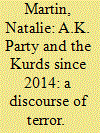

|
|
|
|
|
| Summary/Abstract |
This article will examine A.K.P. (Adalet ve Kalkınma Partisi) discourse surrounding ‘terrorism’ and political violence in Turkey since 2014, concentrating on issues pertaining to the Kurdish question. It explores whether the Turkish government has used its state powers for countering political violence to neuter political opposition in various forms. It analyses the public discourse of the A.K.P. elite to argue that the Turkish government has redefined ‘terrorist’ to mean ‘opponent’. This highlights a discursive strategy of associating perceived threats—the P.Y.D. (Partiya Yekitiya Demokrat), the H.D.P. (Halklarin Demokratik Partisi), Academics for Peace and Amnesty International—with terrorist actors: the P.K.K. (Partiya Karkerên Kurdistan) and Islamic State (I.S.). Taking a critical theoretical approach using securitization theory it explores the underlying power structures at play within this scenario to argue additionally that having initially de-securitized the role of I.S. in Turkey the A.K.P. has, since 2015, re-securitized I.S. for its own purposes including the ongoing delegitimization of its opponents. Ultimately, the widening and apparent malleability of the ‘terrorist’ label in Turkey should be seen as both a symptom of the country’s authoritarian drift since 2007 and a means of sustaining it further.
|
|
|
|
|
|
|
|
|
|
|
|
|
|
|
|
| 2 |
ID:
126202
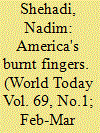

|
|
|
| 3 |
ID:
178601
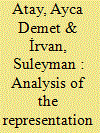

|
|
|
|
|
| Summary/Abstract |
This study assesses the representation of the so-called ‘Solution Process’ between the Turkish state and the insurgent armed organization Kurdistan Workers’ Party within the theoretical frameworks of peace journalism, indexing hypothesis, and Hallin and Mancini's media systems theory. The research comprises a frame analysis of the front page coverage of the ‘Solution Process’ in eleven Turkish newspapers in 2013, which is conducted on a total of 561 news stories. The results show that the Turkish press, with the exception of nationalist newspapers, supported the peace process in the selected time period. However, this peace-supportive approach cannot be attributed to peace journalism because the pro-peace attitude of the news media did not result from an independent journalistic initiative. Therefore, we refer to this type of journalism as ‘state-imposed peace journalism’.
|
|
|
|
|
|
|
|
|
|
|
|
|
|
|
|
| 4 |
ID:
108100
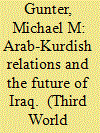

|
|
|
|
|
| Publication |
2011.
|
| Summary/Abstract |
The Iraqi Kurds now not only possess their most powerful regional government since the creation of Iraq following World War I (the Kurdistan Regional Government-krg), but also play a prominent role in the Iraqi government in Baghdad, holding the posts of president, foreign minister and several other cabinet positions. After a great deal of wrangling, the Kurds managed to maintain their strong position in al-Maliki's new Baghdad government finally cobbled together in December 2010. This dual governmental role stood in marked contrast to the situation that existed before the events of 1991 and 2003, when the Kurds were treated as second class citizens and worse. The ultimate question is for how long this unique Kurdish position of strength will last. Many Arabs still resent the Kurdish claims to autonomy as a challenge to the Arab patrimony and see a federal state for the Iraqi Kurds within Iraq as simply a prelude to secession forced upon the Arabs at a moment of temporary weakness following the war in 2003. When will the Iraqi Arabs organise themselves and start trying to reduce the power of the Kurds again? This paper will analyse this developing situation and tentatively conclude that the two sides are most likely to continue to coexist in a troublesome but peaceful relationship.
|
|
|
|
|
|
|
|
|
|
|
|
|
|
|
|
| 5 |
ID:
161148
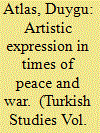

|
|
|
|
|
| Summary/Abstract |
This article traces the effect of the ‘Kurdish opening,’ which led to an artistic surge among Turkey’s Kurdish minority, and the recent renewal of the conflict, which has significantly inhibited that surge. By juxtaposing these two periods, defined in terms of the state’s approach to the Kurds, and looking at the field of Kurdish arts as a space, practice, and discourse, it presents a more holistic picture of Kurdish responses to political turbulence in Turkey, where Kurdish cultural identity and its expression have always been an integral part of the Kurdish political struggle.
|
|
|
|
|
|
|
|
|
|
|
|
|
|
|
|
| 6 |
ID:
171873
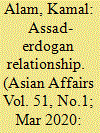

|
|
|
|
|
| Summary/Abstract |
Much has been made of the once brotherly relationship between Syrian President Bashar al Assad and the Turkish President Recep Teyep Erdogan. Indeed, this relationship formed the bedrock of Turkey's much-vaunted move towards the Arab world and its re-engagement with regions on which Ataturk and his successive Kemalist Generals had shut a door. Yet, more than fifteen years after the historic first visits by the Turkish and Syrian leaders to each other's capitals, the Syria-Turkey relationship lies in ruins. Whilst much of the focus of the war in Syria has been on the exaggerated sectarian divide in the Middle East and the great power rivalry between the United States and Russia, a key aspect overlooked is the fundamental relationship between Turkey and Syria. The last two decades of this relationship have been defined by Assad and Erdogan. As Turkey slowly begins to re-engage with Syria one can trace the tumultuous relationship between the two neighbours in the immediate aftermath of the dissolution of the Ottoman Empire. The Arab nationalists and Turkish nationalists have been at daggers drawn over the make up of the border. Syria has never forgotten the land-grab of the Turks in the aftermath of the French exit of the Levant. Furthermore, the diverse set of communities – the Greeks, the Armenians, the Kurds and the Syriacs – that make up the inhabitants of the region still suffer from the effects of the mismanagement of the French exit and what is seen by many of these communities as an illegal annexation by Turks and Arabs. However, under the Syrian Arab Republic the Christians of all denominations including the Armenians and Greeks flourished whilst Turkey forced only one identity upon its once diverse people. This article will argue that the relationship between Syria and Turkey has ebbed and flowed – and this dynamic is rooted in history where successive Turkic dynasties have favoured Syria as their pivot to control the region. Similarly, when Syria became less important, the very foundation of the Turkic and later Turkish influence became weak in the region. The close relationship between Erdogan and Assad overturned more than six decades of animosity, but once Erdogan turned his back to Assad and supported the overthrow of the Syrian government the relationship fell apart. As the end of the war nears, a defining factor to end this war will be how Turkey and Syria reconcile or interact. The Syrian Kurds now seem to be back in Assad's corner as they prefer to be under Damascus' sovereignty then under attack from Ankara across the border. The Kurdish question is of significant value to both Syria and Turkey; it has been a major reason for both countries to be at peace and war. A closer look at the history of these two countries' relationship proves that the Assad-Erdogan relationship has mirrored the history of the two states since the fall of the Ottoman Empire. Their future in more than one way is now inter-twined on how they interact with each other.
|
|
|
|
|
|
|
|
|
|
|
|
|
|
|
|
| 7 |
ID:
088933


|
|
|
|
|
| Publication |
2009.
|
| Summary/Abstract |
This article addresses the conflict over the Euphrates and Tigris waters from the perspective of negotiation theories, by examining the role of power in upstream/downstream negotiations. Conceptual and empirical links are established between water, negotiation (structure, process), power (asymmetries, coalition dynamics, strategies, development of alternatives) and security (direct/indirect interests such as national security, border security, territorial claims, economic development and environmental concerns). The study concludes that asymmetries in power have favored upstream/downstream interactions towards bilateral if not basin-wide arrangements. The framework shows that traditional elements of power, such as upstream positions, military and economic resources, do not constitute the only sources of power. Bargaining power can also determine the dynamics between respective riparians. Time constitutes an important source of power, and interests vary over time when political settings and security concerns shift. Downstream or more vulnerable riparians can invert situations of power asymmetry by acting on the basin-dominant riparian's interests and thus reduce its alternatives. Syria's use of 'issue-linkage' in its interactions with Turkey over water and wider security issues serves as the primary example.
|
|
|
|
|
|
|
|
|
|
|
|
|
|
|
|
| 8 |
ID:
190109
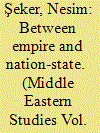

|
|
|
|
|
| Summary/Abstract |
This article addresses the nationality issue in the post-First World War Turkey through an analysis of the vibrant debates on the future of the defeated Ottoman state and its peoples. It focuses on how nationality was formulated, specifically, by the Ottoman Muslim-Turkish intellectuals, publicists and by the leadership of the National Struggle. Their interpretations of Ottomanism, Turkish nationalism, the wartime destruction of the Armenians, the situation of the Greeks and the future of the Kurds is analyzed in this respect by using the columns and editorials of contemporaneous newspapers and printed official documents. It argues that the diametrically opposed secular Ottoman nationalism cherishing co-existence of all ethnic and religious groups and the Ottomanism based on Muslimness-Turkishness were reformulated in radically changed geopolitical and demographic circumstances as the basis of the future collective identity.
|
|
|
|
|
|
|
|
|
|
|
|
|
|
|
|
| 9 |
ID:
188164
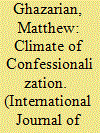

|
|
|
|
|
| Summary/Abstract |
After the 1877–78 Russo-Ottoman War, the Ottoman Empire saw the rise of ethnic and sectarian clashes in Anatolia, the Balkans, and elsewhere, and the task of explaining that rise remains unfinished. Many have examined the intellectual formations of ethnic and sectarian solidarities after 1878, but the availability of new ideas cannot alone account for their widespread uptake. Why after 1878 did ordinary people respond more to calls upon ethnic and sectarian solidarity? Drawing on sources surrounding the 1879 famine in the Ottoman East, this article steps away from imperial metropoles to examine overlapping environmental, financial, and technological disjunctures. Adopting the methods of political ecology, the article underscores the simultaneous effects of drought, sovereign default, and an influx of modern weapons, each of which imposed uneven hardships along ethno-religious lines. Together, they created a climate of lived confessionalization that highlighted the communal categories upon which emergent movements called.
|
|
|
|
|
|
|
|
|
|
|
|
|
|
|
|
| 10 |
ID:
105993
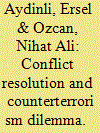

|
|
|
|
|
| Publication |
2011.
|
| Summary/Abstract |
This article considers the relationship between two processes-conflict resolution and counterterrorism-which conceptually share many common points, yet in practice do not necessarily proceed together easily towards a common goal. Considering particular cases of ethnic conflict in which terrorist factions exist, the article argues that while neither conflict resolution nor counterterrorism alone can adequately address the problem, simultaneously conducting both must keep in mind the processes' inherent differences and avoid excessive prioritizing of one over the other. By exploring recent Turkish governmental initiatives to address the Kurdish question, the article attempts to provide an outline for how to successfully cope with the two processes simultaneously.
|
|
|
|
|
|
|
|
|
|
|
|
|
|
|
|
| 11 |
ID:
105584
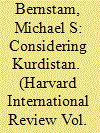

|
|
|
| 12 |
ID:
093758
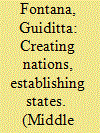

|
|
|
|
|
| Publication |
2010.
|
| Summary/Abstract |
This article explores the creation of modern Iraq in the period between the Armistice of Mudros in October 1918, marking the end of the First World War in the Middle East, and the conclusion of a formal peace treaty with Turkey in 1923. It looks at how far the British occupiers considered the ethno-religious character of the population while defining frontiers and political system in the territory, focusing on the three major ethno-religious groups in Iraq: Shia Arabs, Sunni Arabs and Kurds. It shows that British policy, influenced by the state of Anglo-Turkish relations, the relationship between officials in London and officials in Baghdad, and British economic necessities and public sentiments towards imperialism, evolved through three main phases: progressively, ethnic and religious factors receded in significance.
|
|
|
|
|
|
|
|
|
|
|
|
|
|
|
|
| 13 |
ID:
194444


|
|
|
|
|
| Summary/Abstract |
While the fight against ideological warfare of the Islamic State (ISIS) would not be possible without an effective counter ground operation led by the Kurds, these unique players in regional stability have contributed to the mitigation, and in some cases the elimination of Islamist extremist ideology, conducing to the human security of the region. Viewing these actions within a pro-democracy approach, this paper will demonstrate why the international community, led by the United States and EU, needs to, indeed ought to consider the Kurdish de facto autonomous region model as an element for stability. The resulting outcome could help contribute to the regional security of the Middle East, and also prevent the perpetration of any future atrocities against the Kurds and other minorities. Through a collective case study and a qualitative set of data, this paper will evaluate the de facto autonomous governance experience of the Kurds, its impact, and its potential.
|
|
|
|
|
|
|
|
|
|
|
|
|
|
|
|
| 14 |
ID:
184172
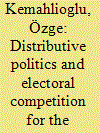

|
|
|
|
|
| Summary/Abstract |
Competition for the Kurdish vote has been important in contemporary Turkish politics. Focusing on the non-contributory health insurance program in the early period of AKP rule, this article shows that this competition also affected the distribution of benefits. Kurdish citizens’ likelihood of holding a Green Card increased with the competitiveness of the district between the AKP and Kurdish-oriented parties. The number of Green Cards and social spending were also higher when a Kurdish-oriented party posed an electoral challenge. These findings reveal the electoral calculation behind AKP’s strategy of favoring Kurdish voters as well as the importance of political organization for the minority group’s access to benefits.
|
|
|
|
|
|
|
|
|
|
|
|
|
|
|
|
| 15 |
ID:
146799
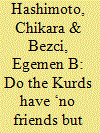

|
|
|
|
|
| Summary/Abstract |
A Kurdish proverb says that the Kurds have ‘no friends but the mountains’. This was not what the Turkish authorities believed. Using new and previously unexploited archives both in English and Turkish, this article offers a new interpretation of Turkey's perception of the Kurds. By analyzing Kurdish activities and their alignment with Communist movements and Soviet activities, it shows how Turkey's threat perception was shaped by international contexts, especially through the Cold War. In addition, the Kurdish nationalist movement in the Middle East played a pivotal role in regional intelligence cooperation between Turkey, Iraq and Iran. This article argues that Soviet and Communist activities had an important role in shaping Turkey's threat perception of the Kurdish minority in the country. Turkey's perception of subversive threats involved an intertwining of Communists, Soviets and Kurds. This affected the Kurdish bid for independence for most of the twentieth century.
|
|
|
|
|
|
|
|
|
|
|
|
|
|
|
|
| 16 |
ID:
127614
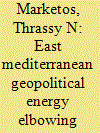

|
|
|
|
|
| Publication |
2013.
|
| Summary/Abstract |
The Leviathan gas deposit discovered in the Eastern Mediterranean Israeli Exclusive Economic Zone (EEZ) in 2010 by the U.S. Noble Energy Company is in fact Syria's stake in "democratization." The drilling of natural gas has given birth to a new conflict in the region: Israel, Syria and the Gaza Strip claiming drilling rights as well.
Cyprus (an EU member country) has not given up either, nor has Lebanon, which asked the U.N. to recognize its right to drill in its territorial waters, Hezbollah being the most vocal in this regard.
Turkey presented Syrian President Bashar al-Assad with the project of a Qatar-Saudi Arabia-Iraq-Syria-Turkey gas pipeline, via which natural gas could have been exported to Europe too, to the detriment of the Russian Federation, however the Syrian President refused, implementing Iran's natural gas pipeline project instead.
Construction of the natural gas pipeline started immediately. Spurred on by the U.S., Turkey, Qatar, and Saudi Arabia began directly supporting the Muslim Brotherhood as a destabilizing element for the "traitorous" regimes that were negotiating the Leviathan's potential with Iran, Russia, China, and India.
Turkish warships are engaged in all kinds of conflicts with American, Israeli, and Cypriot prospecting vessels in the Mediterranean Sea. Turkey imports 60 per cent of its natural gas needs from Russia and cannot allow its "historical enemy" to manage the Leviathan deposit too. It is hoped that the advantage will be reversed once the Muslim Brotherhood comes to power.
This analysis, based on the neo-realist school of thought in geopolitics, aspires to shed light on the geopolitical game being played astride the media coverage of the Syrian civil war and Eastern Mediterranean gas deposit potential.
|
|
|
|
|
|
|
|
|
|
|
|
|
|
|
|
| 17 |
ID:
105387
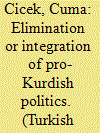

|
|
|
|
|
| Publication |
2011.
|
| Summary/Abstract |
The new geopolitical conditions and the regional seeking of neoliberal, pro-Islamist politics facilitate the ending of the Kurdish conflict in Turkey and to rebuild political relation with the Iraqi Kurds. Besides, the rise of pro-Kurdish politics both within Turkey and Iraq has nearly closed the door on the sustainability of the traditional security policy. However, the AKP's Turkish nationalist ideological-political character, the lack of the deep democratic values in the political tradition of neoliberal pro-Islamic politics and its weak administrative capacity about the Kurdish issue have prevented it from going beyond the traditional national security policy to solve the Kurdish issue and to disarm the PKK.
|
|
|
|
|
|
|
|
|
|
|
|
|
|
|
|
| 18 |
ID:
125300
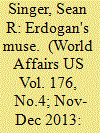

|
|
|
|
|
| Publication |
2013.
|
| Summary/Abstract |
On May 28th, around the same time Turkish Prime Minister Recep Tayyip Erdogan addressed the Justice and Development Party (AKP) delegation in Parliament, as he does most Tuesdays, police were ejecting protesters from Istanbul's Gezi Park. The previous day, environmentalists had begun gathering there to protest the cutting down of trees to make room for the reconstruction of the Halil Pasha Artillery Barracks, which stood on the same plot of land from the early 1800s until 1940. By the end of the week, the protests had grown in intensity, with over a hundred thousand demonstrators and police using tear gas and water cannons to control them. Clashes with police spread from the adjacent Taksim Square to other parts of the city, and later to eighty of Turkey's eighty-one provinces, with more than two million people participating in a movement that by the end of June left five dead and thousands injured. Istanbul alone suffered tens of millions of dollars worth of property damage.
|
|
|
|
|
|
|
|
|
|
|
|
|
|
|
|
| 19 |
ID:
183732
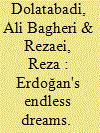

|
|
|
|
|
| Summary/Abstract |
After the Justice and Development Party (AKP) rose to power in 2002, Turkey's Middle East policy underwent a radical change. Erdoğan's readings of the Arab Spring events are a vivid example of Turkey's new foreign policy. In the last months of 2019 and 2020, Turkey took two other important steps that have attracted the attention of the international community: engagement in Operation Peace Spring in northern Syria without UN Security Council authorization, and steps to reach an agreement with the Libyan government on oil and gas exploration in the Mediterranean in tandem with sending troops to Libya. Turkey's recent actions, which violate international law and UN resolutions, raise several questions: what changes have taken place in Turkey's foreign policy? What are its core drivers and main components? And what results will the new policy deliver in the future? We argue that Turkey's behavior conforms to the principles of offensive realism. The shift in Turkey's foreign policy and the trend toward offensive realism are rooted in the 2011 Arab Spring and subsequent events in the Middle East. The failed coup of 2016 accelerated these changes and pushed them in new directions. Turkey is now seriously aiming to maximize its power, particularly in the politico-military field, which could increase tensions in the sensitive region. We submit that Turkey cannot be guided by offensive realism in the long term, however.
|
|
|
|
|
|
|
|
|
|
|
|
|
|
|
|
| 20 |
ID:
111240
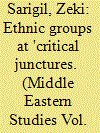

|
|
|
|
|
|
|
|